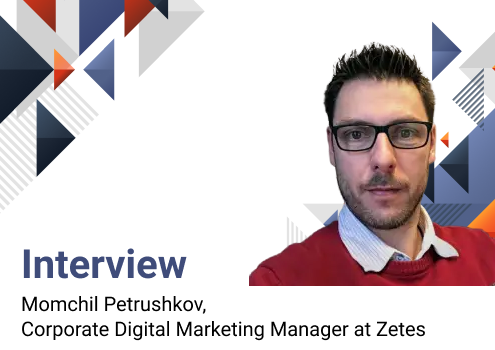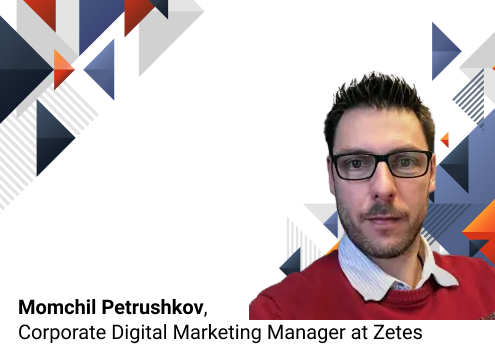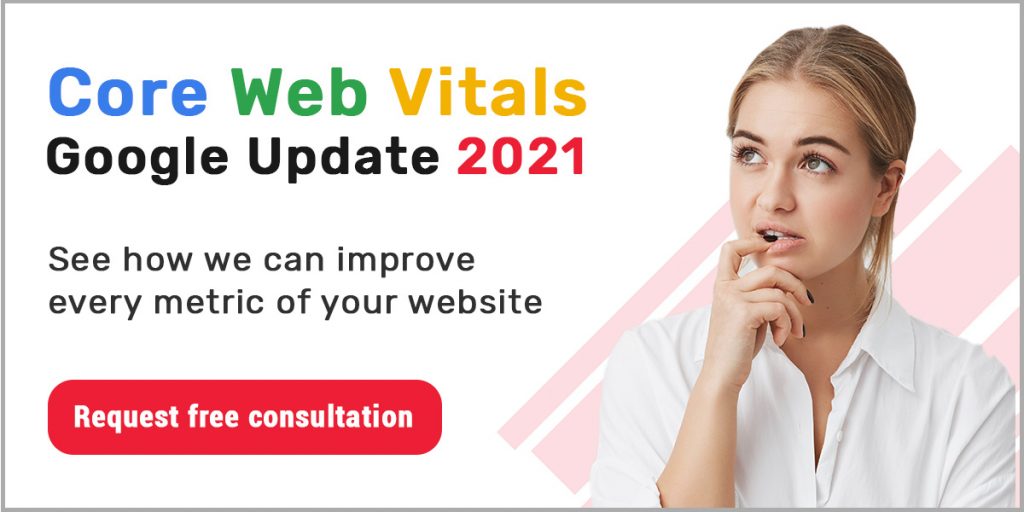We caught up with Momchil Petrushkov, Corporate Digital Marketing Manager at Zetes, to find out how the speed optimization of their website (implemented together with AirDesigns) helped them overtake their competitors during the Covid-19 pandemic.
Tell us a few words about yourself? How long have you been involved in the digital marketing field?
Sure. Currently, I am the Corporate Digital Marketing Manager at Zetes. I’ve been working with Zetes for more than four years now. All in all, I’ve been in marketing for the past 13 years. I started as an SEO specialist and then moved to the full set of digital tools and marketing channels. So, I am completely fascinated by the digital industry.
It sounds like a rich background and this shows in our mutual work. Why did you have Zetes move toward optimizing their website for speed? What were the reasons behind this decision?
At Zetes, we try to evolve constantly. Like any other company, I would imagine, we do put a lot of effort into our website and digital presence. It’s an ongoing effort. We operate in an environment that is very tough. We have very severe competitors out there who have a large team of specialists, and we have to compete with them pretty much every day. It’s crucial to stay at the top of our game.
Four years ago, when I joined the company, the first thing we did was to revamp our website and pretty much started from scratch. Then we moved on to the on-site aspect of SEO – internal linking, meta titles, and everything else. Moving forward to the big steps on speed optimization that we did together with AirDesigns, was only logical.
So, the reason behind this decision was pretty much because we wanted to stay ahead of everybody else. We monitor our ranking weekly, and we wanted to make sure that for the keywords that are really important for us, we rank first, second, or maximum third. This is the reason why we wanted to push one step further.
Can you quickly sum up some of the improvements that were implemented on the website?
We went for full speed optimization. For us, it was important to go through the process and make sure everything is optimized. We didn’t want to leave anything for later. We didn’t want to have a B phase or second rollout.
So we did a couple of major steps along the way. The first was to implement a completely separate caching server. We wanted to deliver the content of the website in less than a second, which is crucial, especially considering that our competitors usually load their websites for more than 3 seconds.
Related article: Why You Need a Seriously Fast Website
We realized that if we could load everything in less than a second or between 1- or 2-seconds max, we would have a huge competitive advantage. So, the caching server was a no-brainer. We decided to host everything on our server, on the premises, because the nature of our business requires us to keep our servers in the internal company infrastructure. Of course, you guys helped with the server setup, with all the configuration and optimization. So that was super valuable and something we couldn’t have done on our end alone.
The other thing was that we wanted to make sure that we optimize and cache the website images directly on the server. And not only that but to make them far more efficient and smaller without losing their quality. Whatever render on the site had to be very fast and optimized according to Google’s rules. This would help us rank higher up.
Of course, we also touched all the JavaScript files, all the CSS files. There was a severe amount of minification and compression involved, which was a bit of a ping pong before it was all well – you know, we ended up breaking and fixing the website a few times. We did all this on a QA server that was developed at the same time. We tested everything on the QA, and then when it was all working fine, we pushed it on to the live environment. That was really a game-changer for us because that wasn’t the way we used to do things before.
Yes, a staging environment is very important because it helps ensure the reliability of the code, pipeline, infrastructure, and full control over what and when gets released to the live website. I always advise our clients to add a QA server to their workflow.
BTW, thanks for the awesome overview of the process. What was the average increase in speed that you observed and how long did it take to see the change?
We saw the speed increase right after implementing the changes, and the new server cached the entire website. We used two separate tools to track the website’s speed – Web.dev and GTMetrix to make sure that whatever we see is actually real, or at least close to real.
In plain numbers, before launching the optimization process, the website loaded in 3.7 seconds. We’ve run servers in Frankfurt and London because we mainly prioritize European traffic. It was important how well we rank in Europe. Once everything was implemented, we dropped down to 1.2 seconds from London and 0.9 seconds from Frankfurt, which is like a 300% improvement in the overall speed. It was just great.
Great. Can you translate those numbers into real-world data? How did this affect your ranking position, conversion rate, and, of course, your actual business?
For most of our keywords, about 85%, we were already ranking between positions 1 and 3. Our market is very specific, so we optimize for longtail keywords. So for us, I wouldn’t say it’s easy, but it’s easier to target the right people with the right keywords because we do due diligence of keywords. So, we were ranking really well. The main goal with this exercise was actually to keep up that ranking. And that happened. And not only that, but we saw an increase in ranking for some of the smaller countries we target. For example, in Italy, we were not doing so well, but with the speed optimization, maybe about three-four months later, there was a drastic increase in conversions coming from both Google and Bing. So that was really good. We also saw a specific increase in conversions of visitors from Austria. For the rest of the countries that were already performing well, there was definitely an improvement.
However, what we did see, and that’s really an important factor for us, was the actual conversion rate on all the contact forms. The overall conversion rate of the website visitors increased too. We didn’t see a huge spike in traffic, but we saw a huge spike in conversions. We have about a 24% increase in conversion rate on our contact forms, which is huge.
Even though we kept and sometimes even had a decrease in the traffic, you know, because of the Covid-19 crises and several other reasons, we actually saw a great increase in conversions. The quality of the leads has improved significantly as well.
The time on the site has increased too. That’s generally because the people don’t wait that long for the website to load, so they don’t bounce off the website before seeing the page’s content. We were able to present the content in a much faster way, which is definitely more efficient.
That sounds awesome. I imagine that all this has affected the company’s revenue. Can you share something regarding this topic?
I wouldn’t be able to share information about company revenue. I can say, though, yes, it had a positive impact. We operate in a market where the sales cycle is very long – for us, it’s normal to have 1- to a 1-and-half year long sales cycle, so I expect to see the actual results in 6 months from now. It’s already been a year since we improved the website’s speed, but I know we engaged with very interesting people, very interesting leads, and started several conversions.
If I look at the website’s performance from a business perspective, it’s quite steady now, and I even expect to increase substantially. I am very positive, even in Covid-19 times.
I know that there were some talks regarding new and exciting projects, Zetes is considering working on in terms of web performance. Can you tell us a bit more about them?
Well, for us, it’s a never-ending story. We want to make sure that we stay on top of our game. So now that the website is loading faster, we want to keep on with the requirements from Google, Bing, and pretty much all the other smaller search engines.
We will be concentrating on the things that haven’t been done yet. Specifically, we would implement Google’s website performance guidance (Web Core Vitals). Google’s new page experience update is coming May 2021, and we should prepare the website for it. We will optimize FCP (first contentful paint) and LCP (largest contentful paint) for sure. We will also have to work on the mobile version of the website.
Related article: Optimizing for Core Web Vitals: Top 10 Pain Points and How We Solved Them for Our Clients
We are also really excited about moving forward with those tasks. And one last question that is a little bit off-topic, but can you share what frustrates you in the current digital landscape. What do you like to see improved in 2021?
I am just like all other digital guys, I would say. For me, the most frustrating fact is the GDPR obviously and the fact that I cannot utilize cookies to the maximum. I wouldn’t say it’s a showstopper, but I would say it creates more problems, specifically regarding retargeting and re-engaging with your audience. In our business, we don’t use digital ads and promotions just as a lead-gen machine. We actually use them as a communication method, specifically taking into account that the open email rates are not what they used to be back in the day. So now, what we actually do is to communicate through ads with our customers. Not being able to retarget the right audience simply because they do not accept the cookies or change their browser is a big problem, and it’s really frustrating. For the rest, again it’s a game that always changes and you just need to stay on top of it.
I can see that. I hope that we will be able to stay on the edge of the upcoming changes. Thank you very much for your time, and I look forward to continuing working with Zetes.
Very welcome!
Get the most out of 2021
Don’t miss the opportunities the new year has to offer. Get in touch with us for a first free review and consultation, and learn how we can help grow your online business.





